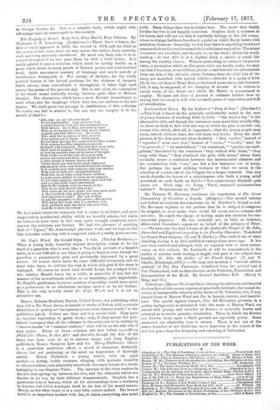Messrs. Roberts Brothers, Boston, United States, are publishing what they
call a No-Name Series, to consist of works of fiction, with a certain admixture of poetry,—" anonymous poems from famous hands," as the publishers put it. Critics are thus put to a severe trial. They have no familiar reputation to guide them ; only, if they accept the pub- lishers' assurance that all the volumes in the series are to be written by "famous hands" or "eminent authors," they will be on the safe side if they praise. Three of these volumes are new before us,—Mercy Phi/brick's Choice, Is that All? and .Deirdri, though the first of the three has been sent to us in another shape, and from English publishers, Messrs. Sampson Low and Co. Mercy Phi/brick's Choice is a somewhat ambitions effort, a novel of character, distinctly clever, but not producing on the mind an impression of thorough reality. Mercy Philbrick, a young widow, with an aged mother—a loving, feeble creature, clinging with pathetic tenacity to old associations, and admirably described—becomes tenant of a house belonging to one Stephen White. The interest of the story centres in the love that springs up between the two, and the obstacles which are thrown in its way by their different temperaments. Stephen has a passionate love of beauty, which all his surroundings have a tendency to depress, but which dovelopes itself to the loss of his moral nature. Mercy, on the other hand, is of a very lofty nature indeed. The love of truth is an imperious instinct with her, to which everything else must yield. Many things thus rise to hinder love. The cause that finally divides the two is not happily contrived. Stephen finds a treasure in his house, and will not see that it rightfully belongs to the old owner, whose mortgage had been foreclosed, a point on which Mercy insists with unshaken firmness. Generally we feel that there is something forced and unnatural about the two lovers and their relations to each other. The minor characters are excellent, and the tale is, on the whol., distinctly worth reading.—Is that All? is of a slighter kind, a aketch of social life among the wealthy class3s. Without pretending to estimate its precise value, a pretension which an European critic can hardly make, we may say that it is a clear, even brilliant, pictaro ; and that the two adventurers from our side of the Atlantic, whose fortunes form the chief plot of the story, are described with special felicity.—Deirdre is a poem of Irish life in the old days of Home-Rule, a thousand years since, and therefore full, it may be supposed, of the clanging of swords. It is written in heroic verse, of the fluent sort which Mr. Morris is accustomed to employ. We have not time at present to estimate further than by saying that the story is told with no small power of expression and skill of versification.


































 Previous page
Previous page